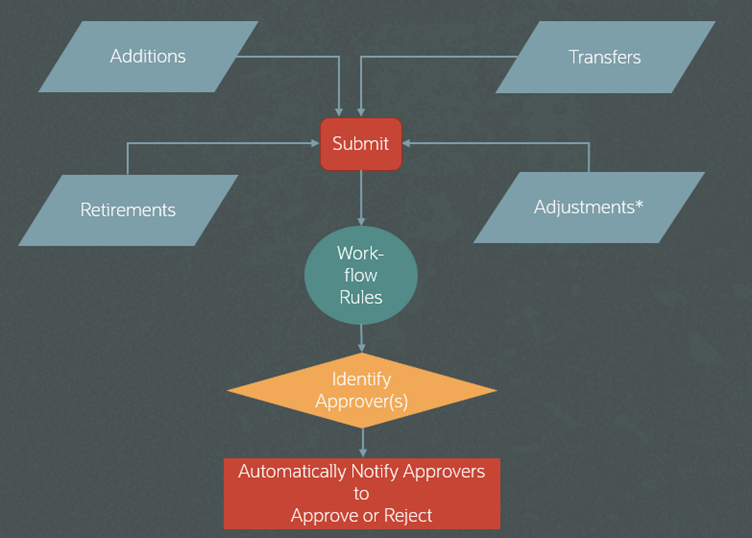The asset capitalization process for fixed assets requires a certain level of governance to review and approve the capital costs that are initialized as the cost of an asset. Similar governance is required for movement of assets, retirements, and other forms of cost adjustments.
The 24C quarterly update for Fusion Assets introduces approval rules for asset additions, cost or depreciation rule adjustments, reclassifications, transfers, and retirements.
This blog post highlights how you can optimize controls for managing the fixed assets lifecycle to route exceptions for manager approvals. Assets can automatically approve or reject transactions depending on the approval rules you define to meet your business policies.
The approval workflow eliminates paperwork. It serves as a central source of information about all the transactions pertaining to assets approval. It also enables you to document compliance and drive accountability with a recording of the audit trail.
How to configure asset approvals
Implementers can enable asset approvals for asset corporate books and, if required, for asset tax books. Approval rules can be specific to each asset book, or they can be shared across asset books. Once enabled for an asset corporate book, applicable asset transactions would be subjected to an approvals process. Typically, asset transactions are copied from asset corporate books to their related asset tax books. Therefore, only transactions entered directly into an asset tax book will be subject to asset approvals, if asset approval has been enabled for a specific asset tax book.
You define and manage workflow rules using a spreadsheet. Define asset specific and mass asset transaction approval rules using the Asset Transaction Approval Basic Template. It is accessed from the Manage Workflow Rules in Spreadsheet task in Fusion Assets. The template provides a simple layout for defining workflow rules in accordance with an organization’s approval policy.
You can define approval rules to send notifications to:
- Supervisory Hierarchy
- Approval groups (Group in Serial, Group in Parallel, Group first Responder)
- Job Level Hierarchy
- Specific users
- User with specific application role
Implementers can define rule conditions to automatically reject or automatically approve transactions based on the rule conditions.
Define data sets in approval rules to route to different approvers depending on certain transaction attributes
If the approver for a transaction varies depending on certain transaction attributes, implementers can use data sets while defining the approval rule. Use data sets to determine which users should approve or reject a transaction. The data set maps transaction attribute values to approver(s).
For example, a retirement that requires approval from the managers responsible for the related cost center. Similarly, a cost addition with varying cost range may require approval from three levels of managers for an asset book.
Tip: Define asset approval rules for all possible use cases and conditions.
How asset approvals process flow works
Asset transactions approval process starts when the system posts the asset transaction. Asset transaction approval is triggered when the user clicks the Submit button for a single asset transaction. Approvals of Mass Transactions are posted after the transactions are approved when the queue status is Post for those Mass Transactions.
Workflow builds the list of approvers based on the defined rules. It sends the approval notifications to the first set of approvers in the list. Approvers can approve or reject a transaction directly from notifications. FYI notifications can also be enabled. When the approvers respond, workflow sends the notifications to the next set of approvers. This process repeats until all approvals are complete. Fusion Assets posts transactions automatically when the final approver approves the transaction.
Approval history is stored for audit trail purpose and viewed from Asset Inquiry.
If an asset transaction approval request was rejected, the asset transactions can be re-submitted. If you don’t want the rejected asset transactions to be processed, change the status to Delete status.

Key implementation considerations
When preparing rules for entering into a spreadsheet, it is important to consider various aspects of the business rule to ensure accuracy, clarity, and effectiveness.
Here are some key aspects to decide:
- If the transaction requires approval.
- The approvers of the transaction.
- Whether transactions can be automatically approved or automatically rejected.
- If FYI notifications are necessary for approvals under a particular rule.
Tip: It’s very important that the rules in a rule set cover all conditions and are collectively exhaustive. If not, errors might occur.
The rule history in the Manage Workflow Rules in Spreadsheet task stores the copy of the rule template of the last successful rule upload. You can download this template to review or modify the rules. The rules are overwritten after every successful upload. You can view the upload history in the Manage Workflow Rules in Spreadsheet.
Conclusion
Benefit from the asset approval workflow to
- eliminate paperwork with a centralized source of information about all the transactions pertaining to asset approvals.
- facilitate compliance with internal controls.
- provide better accountability and recording of the audit trail.
- enable easier coordination within the accounting department.
Useful resources
What’s new in fusion Financials 24C: EXCEPTION-BASED APPROVALS FOR FIXED ASSET TRANSACTIONS
My Oracle Support: Assets Approvals topical essay (Doc ID 3025197.1)
